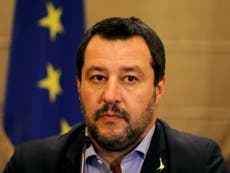Europe’s far right seems determined to hijack Christianity in its bid for power
Today Catholic fundamentalism is fully mixed with anti-Muslim feeling, disguised antisemitism, racism and a narrow anti-EU nationalism

An 800-year-old monastery in Italy’s Apennine mountains has become the latest battleground in a bitter war of ideas.
The imposing buildings of Trisulti to the east of Rome have been leased by the Dignitatis Humanae Institute, a think tank led by Benjamin Harnwell, a British former political aide linked to the US right-wing ideologue Steve Bannon.
It is part of a Europe-wide effort to legitimise far-right and xenophobic forces; to teach a new generation how to deliver hate and demagogy into the mainstream. And they are hijacking Christianity to do it.
Bannon’s relevance is usually overplayed by many commentators (he still counts for very little in Europe), but the creation and aims of this monastery-based “Academy for the Judeo-Christian West” are symptomatic of a wider trend.
Support has come from Cardinal Burke, an ultra-conservative US figure who represents a group of ultra-Catholic and traditionalist “anti-Popes” which is close to some influential conservative voices in the Vatican. They are challenging Pope Francis’s progressive agenda and his pro-immigrant and refugee policies.
And they now have obvious bedfellows in Italy’s government. The bellicose far-right and xenophobic interior minister Matteo Salvini responded to papal concerns over the fate of migrants at sea with typical disdain, declaring: “The Church is ... against us. I was expecting this.”
And this is a man who has sworn on the bible at a party rally and clutches a rosary.
Organisations such as Dignitatis Humanae criticise the Pope in the name of an old-fashioned idea of Christendom. There is a twisted nostalgia for an old-style Catholic life, and for the protection of the Judeo-Christian roots of western civilisation. This has become a natural point of contact between a particular brand of Catholicism, the contemporary far-right and US white nationalists.
They share a desire to attack Islam and to forge a narrative around an “invasion” of migrants from Islamic countries.
Cardinal Burke has offered dark warnings about the rise of Sharia law. He also claimed that countries such as Italy face the risk of a Muslim majority population in the near future if birth rates and immigration trends are not reversed.
On a similar note, Harnwell has railed against politicians from traditional Christian democratic parties for failing to follow his own troubling conclusion that Muslims are “members of a religion which is innately ... aggressive”.
Conservative thinking in the church is moving further to the right. And the presence of the liberal Pope Francis is radicalising and accelerating this process.
People like Burke and Harnwell are not ashamed to be associated with extremists such as Bannon or Salvini. In doing so, they in effect legitimise and defend far-right groups and racist doctrines.
Harnwell has even tried to reject the idea of a rise in the far right by imagining that the passing of time and the evolution of ideas are some kind of inconvenience. He has argued that decades of liberal and progressive politics since the Second World War have simply reframed the debate, “so what we have now, what we would call ‘far right’, it’s really basically just centre, centre right”.
There is nothing completely new in this story. Historically an ultra-conservative wing of the church has often had ties with extremism on the right. Fascistic movements such as Spain’s Falangism, and the interwar Iron Guard in Romania or Belgian Rexism were, for example, influenced by authoritarian forms of Catholic or Orthodox Christianity.
Let us not forget that the Vatican maintained a notable silence on its connections with Mussolini. After 1945 some fascists enjoyed the support of certain Catholic circles (and the Red Cross) and were helped, through the so-called ratlines, to reach the “safer” South America and Franco’s dictatorship in Spain.
In places like France, part of the clergy was discredited, as it was mostly silent on some of the Vichy government’s fascistic or antisemitic policies.
In Italy, when a group of nostalgic fascists managed to steal Il Duce’s corpse from a cemetery in April 1946, they moved it to a monastery where it was hidden by two priests. From the end of the 1970s, there was also the rapprochement of a strand of Catholic fundamentalism with Jean-Marie Le Pen’s far-right party, the Front National now led by his daughter Marine.
Today, especially in eastern Europe, this Catholic fundamentalism is fully mixed with anti-Muslim feeling. At times there is also disguised antisemitism, racism and a narrow anti-EU nationalism.
Radio Maryja, the controversial Polish religious broadcaster, has been a key example of this trend since the 1990s. Similarly, Hungarian prime minister Viktor Orban is presented as a Christian bastion against the Islamisation of the European continent.
Extremists such as Mario Borghezio, a vocal European MP from Salvini’s Lega party, was recorded advising French identitary activists from Bloc Identitaire and Nissa Rebela how to infiltrate into society and assemblies by using a “regionalist” or “Catholic” camouflage.
There are many in church circles and the Vatican who are trying to challenge Salvini for his political uses of Catholic symbols. However, the activities of Radio Maryja, Cardinal Burke and the new Academy in the Trisulti monastery persist in seeking to popularise a far-right agenda and normalise extremist beliefs.
They are using Christianity as a Trojan horse to attract conservative voters who are opposed to the progressive and pro-immigration stance of Catholicism under Pope Francis.
Andrea Mammone is a historian at Royal Holloway, University of London, and currently a visiting fellow in the Robert Schuman Centre for Advanced Studies at the European University Institute



Join our commenting forum
Join thought-provoking conversations, follow other Independent readers and see their replies